British monarchy
The role of the British monarchy
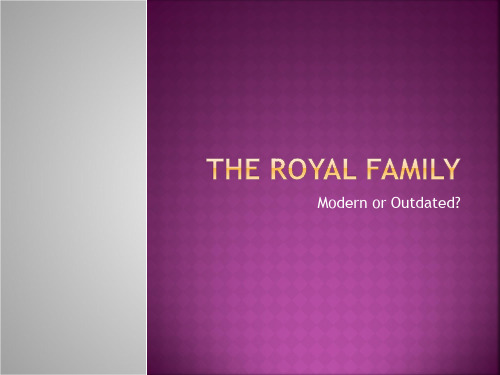
Will this change the public’s outlook on the royal family?
Modern or Outdated?
What
role does the monarchy play in the 21st century?
Monarchs
had the right to make laws until the end of the 17th century. Monarchy dates back to the Anglo-Saxons in the 5th century “divine right of kings” – authority from God The monarchy historically has caused many battles and feuds over who is the REAL heir to the throne Britain has had a king or queen as the head of state for 1000 years
Title: Her Majesty the Queen Born: April 12, 1926
Queen Elizabeth’s husband. Married on November 20, 1947
The Prince of Wales Son of Queen Elizabeth
The Duke of York Son of Queen Elizabeth
The Earl of Wessex Son of Queen Elizabeth
The Princess Royal Queen Elizabeth’s Daughter
British Parliamentary Monarchy
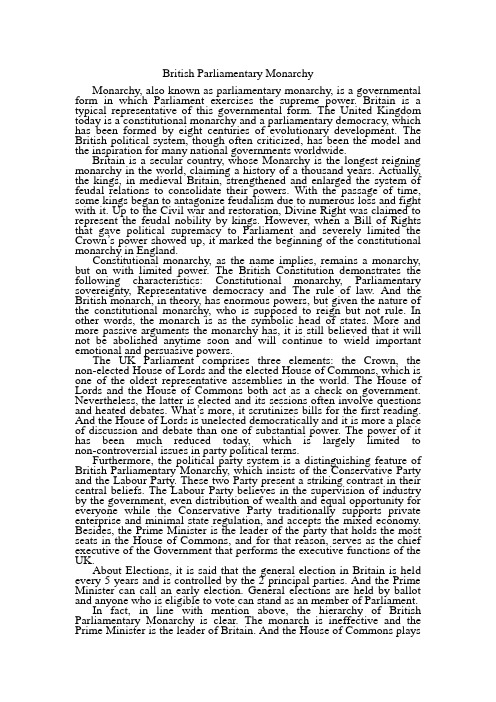
British Parliamentary MonarchyMonarchy, also known as parliamentary monarchy, is a governmental form in which Parliament exercises the supreme power. Britain is a typical representative of this governmental form. The United Kingdom today is a constitutional monarchy and a parliamentary democracy, which has been formed by eight centuries of evolutionary development. The British political system, though often criticized, has been the model and the inspiration for many national governments worldwide.Britain is a secular country, whose Monarchy is the longest reigning monarchy in the world, claiming a history of a thousand years. Actually, the kings, in medieval Britain, strengthened and enlarged the system of feudal relations to consolidate their powers. With the passage of time, some kings began to antagonize feudalism due to numerous loss and fight with it. Up to the Civil war and restoration, Divine Right was claimed to represent the feudal nobility by kings. However, when a Bill of Rights that gave political supremacy to Parliament and severely limited the Crown’s power showed up, it marked the beginning of the constitutional monarchy in England.Constitutional monarchy, as the name implies, remains a monarchy, but on with limited power. The British Constitution demonstrates the following characteristics: Constitutional monarchy, Parliamentary sovereignty, Representative democracy and The rule of law. And the British monarch, in theory, has enormous powers, but given the nature of the constitutional monarchy, who is supposed to reign but not rule. In other words, the monarch is as the symbolic head of states. More and more passive arguments the monarchy has, it is still believed that it will not be abolished anytime soon and will continue to wield important emotional and persuasive powers.The UK Parliament comprises three elements: the Crown, the non-elected House of Lords and the elected House of Commons, which is one of the oldest representative assemblies in the world. The House of Lords and the House of Commons both act as a check on government. Nevertheless, the latter is elected and its sessions often involve questions and heated debates. What’s more, it scrutinizes bills for the first reading. And the House of Lords is unelected democratically and it is more a place of discussion and debate than one of substantial power. The power of it has been much reduced today, which is largely limited to non-controversial issues in party political terms.Furthermore, the political party system is a distinguishing feature of British Parliamentary Monarchy, which insists of the Conservative Party and the Labour Party. These two Party present a striking contrast in their central beliefs. The Labour Party believes in the supervision of industry by the government, even distribution of wealth and equal opportunity for everyone while the Conservative Party traditionally supports private enterprise and minimal state regulation, and accepts the mixed economy. Besides, the Prime Minister is the leader of the party that holds the most seats in the House of Commons, and for that reason, serves as the chief executive of the Government that performs the executive functions of the UK.About Elections, it is said that the general election in Britain is held every 5 years and is controlled by the 2 principal parties. And the Prime Minister can call an early election. General elections are held by ballot and anyone who is eligible to vote can stand as an member of Parliament.In fact, in line with mention above, the hierarchy of British Parliamentary Monarchy is clear. The monarch is ineffective and the Prime Minister is the leader of Britain. And the House of Commons playsa more important role than the House of Lords does. Two Parties fight with each other over and over all the time, which has not a exact result. In addition, the Constitutional Monarchy contains legislature, executive and judiciary, which restrict each other and interact each other.All in all, in the developed process of British Parliamentary Monarchy, the seat of power has slowly passed from the non-democratic Crown to the aristocratic Lords and to its final resting place in the House of Commons with a powerful Prime Minister. This process has been accompanied by a gradual progress of democracy for the people----from the growth of political parties to extension of the universal franchise and to the development of local government and devolution.。
the british monarchy

The Queen And The Commonwealth
From Australia to Antigua, Canada to Cameroon, the
Commonwealth is a remarkable international organisation,
spanning every geographical region, religion and culture. It exists to foster international co-operation and trade links between people all over the world. The Queen is Head of State of 15 Commonwealth realms in addition to the UK. She is also Head of the Commonwealth itself, a voluntary association of 53 independent countries.
Her Majesty The Queen
The Queen is Head of State of the UK and 15 other Commonwealth realms. The elder daughter of King George VI
and Queen Elizabeth, she was born in 1926 and became Queen
approximately 450 are funded by the taxpayer. The staff work across a wide range of professions, including catering,
英国女王重要性英语作文
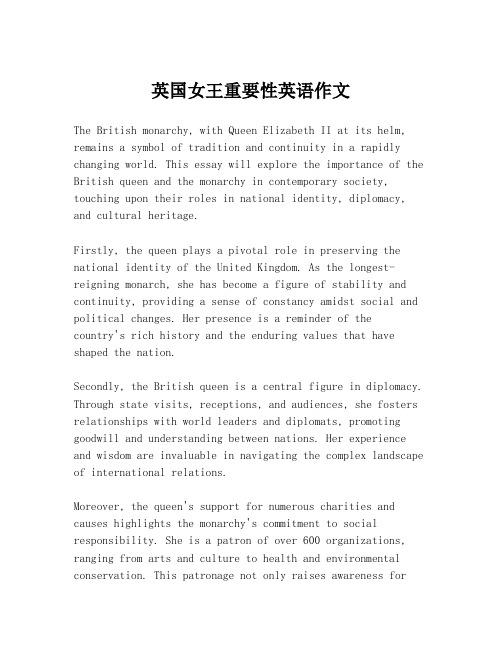
英国女王重要性英语作文The British monarchy, with Queen Elizabeth II at its helm, remains a symbol of tradition and continuity in a rapidly changing world. This essay will explore the importance of the British queen and the monarchy in contemporary society, touching upon their roles in national identity, diplomacy, and cultural heritage.Firstly, the queen plays a pivotal role in preserving the national identity of the United Kingdom. As the longest-reigning monarch, she has become a figure of stability and continuity, providing a sense of constancy amidst social and political changes. Her presence is a reminder of thecountry's rich history and the enduring values that have shaped the nation.Secondly, the British queen is a central figure in diplomacy. Through state visits, receptions, and audiences, she fosters relationships with world leaders and diplomats, promoting goodwill and understanding between nations. Her experience and wisdom are invaluable in navigating the complex landscape of international relations.Moreover, the queen's support for numerous charities and causes highlights the monarchy's commitment to social responsibility. She is a patron of over 600 organizations, ranging from arts and culture to health and environmental conservation. This patronage not only raises awareness forthese issues but also encourages public participation in philanthropic activities.Culturally, the British monarchy is a significant contributor to the country's heritage. The queen's official residences, such as Buckingham Palace and Windsor Castle, are not only tourist attractions but also repositories of art and history. They house vast collections that are open to the public, allowing people to engage with and appreciate the artistic and historical treasures of the nation.In conclusion, the British queen and the monarchy continue to hold significant importance in modern society. They serve as a bridge between the past and the present, representing a unique blend of tradition and modernity. The queen's role in national identity, diplomacy, and cultural preservation underscores the monarchy's relevance and enduring appeal in the 21st century.。
英语国家概况英国的政府体制

英语国家概况英国的政府体制看英国的征服体制,了解这个国家的概况情况。
下面是店铺带来英国的政府体制相关介绍,欢迎大家阅读!英语国家概况:英国的政府体制介绍Government and Administration英国政府机构I.General knowledgeThe United Kingdom is a constitutional monarchy,the head of state is a king or a queen. The UnitedKingdom is governed, in the name of the Sovereignby His or Her Majesty's Government. The System ofparliamentary government is not based on a writtenconstitution, the British constitution is not set out in any single document. It is made up ofstatute law, common law and conventions. The Judiciary determines common law andinterprets statutes.联合王国是君主立宪制国家,国家的首脑是国王或女王。
联合王国以君的名义,由国王或女王陛下政府治理。
英国的议会制度并不是基于成文宪法,英国宪法不由单一文件构成,而由成文法,习惯法和惯例组成。
司法部门裁定习惯法或解释成文法。
英语国家概况:英国的政府体制(君主立宪制)Constitutional monarchy 君主立宪制The British monarchy is known as constitutional monarchy. It means the monarchy's powerare limited by law and Parliament. The monarchy actually has no ral power. Constitutionalmonarchy began after the Glorious Revolution in 1688.英国的君主体制是以君主立宪闻名的。
The British Monarchy
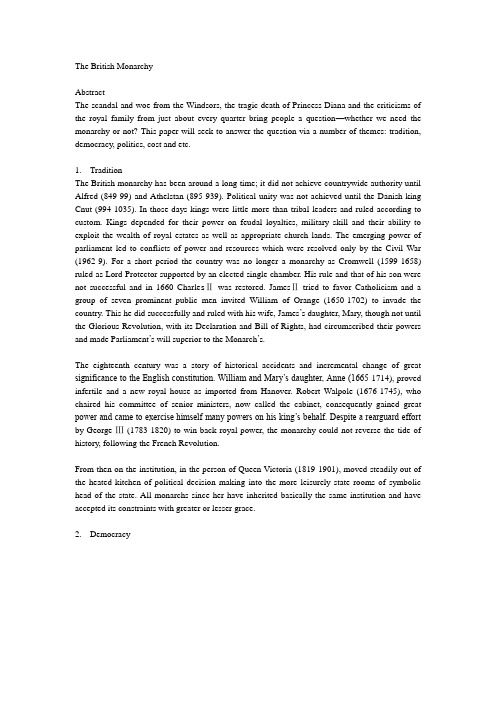
The British MonarchyAbstractThe scandal and woe from the Windsors, the tragic death of Princess Diana and the criticisms of the royal family from just about every quarter bring people a question—whether we need the monarchy or not? This paper will seek to answer the question via a number of themes: tradition, democracy, politics, cost and etc.1.TraditionThe British monarchy has been around a long time; it did not achieve countrywide authority until Alfred (849-99) and Athelstan (895-939). Political unity was not achieved until the Danish king Cnut (994-1035). In those days kings were little more than tribal leaders and ruled according to custom. Kings depended for their power on feudal loyalties, military skill and their ability to exploit the wealth of royal estates as well as appropriate church lands. The emerging power of parliament led to conflicts of power and resources which were resolved only by the Civil War (1962-9). For a short period the country was no longer a monarchy as Cromwell (1599-1658) ruled as Lord Protector supported by an elected single chamber. His rule and that of his son were not successful and in 1660 Charle sⅡwas restored. JamesⅡtried to favor Catholicism and a group of seven prominent public men invited William of Orange (1650-1702) to invade the country. This he did successfully and ruled with his wife, James’s daughter, Mary, though not until the Glorious Revolution, with its Declaration and Bill of Rights, had circumscribed their powers and made Parliament’s will superior to the Monarch’s.The eighteenth century was a story of historical accidents and incremental change of great significance to the English constitution. William and Mary’s daughter, Anne (1665-1714), proved infertile and a new royal house as imported from Hanover. Robert Walpole (1676-1745), who chaired his committee of senior ministers, now called the cabinet, consequently gained great power and came to exercise himself many powers on his king’s behalf. Despite a rearguard effort by George Ⅲ (1783-1820) to win back royal power, the monarchy could not reverse the tide of history, following the French Revolution.From then on the institution, in the person of Queen Victoria (1819-1901), moved steadily out of the heated kitchen of political decision making into the more leisurely state rooms of symbolic head of the state. All monarchs since her have inherited basically the same institution and have accepted its constraints with greater or lesser grace.2.Democracy。
英国国家概况 Unit2
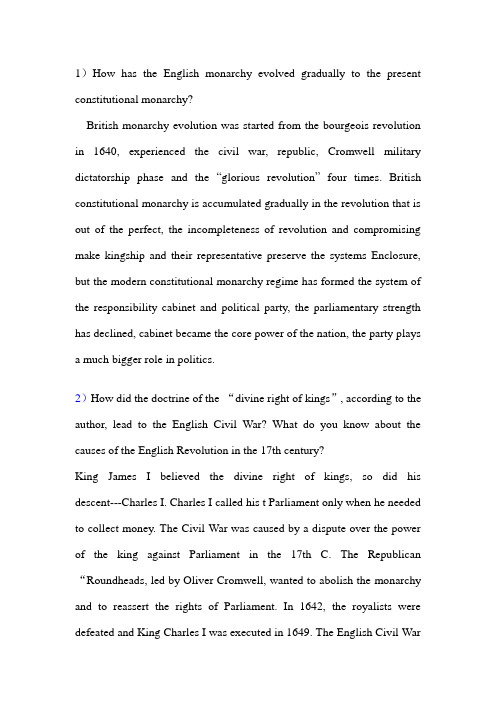
1)How has the English monarchy evolved gradually to the present constitutional monarchy?British monarchy evolution was started from the bourgeois revolution in 1640, experienced the civil war, republic, Cromwell military dictatorship phase and the “glorious revolution”four times. British constitutional monarchy is accumulated gradually in the revolution that is out of the perfect, the incompleteness of revolution and compromising make kingship and their representative preserve the systems Enclosure, but the modern constitutional monarchy regime has formed the system of the responsibility cabinet and political party, the parliamentary strength has declined, cabinet became the core power of the nation, the party plays a much bigger role in politics.2)How did the doctrine of the “divine right of kings”, according to the author, lead to the English Civil War? What do you know about the causes of the English Revolution in the 17th century?King James I believed the divine right of kings, so did his descent---Charles I. Charles I called his t Parliament only when he needed to collect money. The Civil War was caused by a dispute over the power of the king against Parliament in the 17th C. The Republican “Roundheads, led by Oliver Cromwell, wanted to abolish the monarchy and to reassert the rights of Parliament. In 1642, the royalists were defeated and King Charles I was executed in 1649. The English Civil Warnot only overthrew feudal in England but also shook the foundation of the feudal rule in Europe. It is generally regarded as the beginning of modern world history. The Civil War was in essence a capitalist revolution because capitalism paved its way of developmentafter the war.3)history: In feudal England,England had came through a lot: Norman Rule including William and Henry, the Great Charter, signed in 1215,which meant the beginning of Parliament.Then in August 1642, the Civil War between the Parliament and the King began.It not only overthrew feudal system in England but also shook the foundation of the feudal rule in Europe. Then the Glorious Revolution of 1688 meant every English monarchy ruled by permission of Parliament since then.Role: real sovereignty, country gentry, merchants,artisans4). the major charactersitics and the main content of the British constitutioncharacteristics:1.The UK has no written constitution in any document,2.The constitution is only partly written and contained in multiple documents,3. the constitution is flexible.the major Content: ( the British constitution consists of multiple documents including the written part and the entire body of laws encactedby Parliament, precedents and so on.)1. Statue law2. common law3. conventions5).Why does the author say that parliament is supreme in the British state? What function does parliament have? What role does the Queen (King) and the Prime Minister play in British government?The Parliament of the United Kingdom of Great Britain and Northern Ireland is the supreme legislative body in the United Kingdom and British overseas territories. Parliament alone has parliamentary sovereignty and thereby ultimate power over all other political bodies in the United Kingdom and its territories.In a monarchy a king or queen is Head of State. This means that, while The Queen is Head of State, the ability to make and pass legislation resides with an elected Parliament. Although the British Sovereign no longer has a political or executive role, he or she continues to play an important part in the life of the nation. As Head of State, the Queen undertakes constitutional and representational duties which have developed over one thousand years of history. In addition to these State duties, The Queen has a less formal role as 'Head of Nation'. She acts as a focus for national identity, unity and pride; gives a sense of stability and continuity; officially recognizes success and excellence; and supports theideal of public and voluntary service.Prime Minister is the nucleus of Cabinet.1.Patronage of Important Personnel2. Top Executive Power3. Control of Cabinet and Its Activities4. Leadership of Government.5. Control of Government’s Financial Situation6. Deciding the Date for a General Election7. Actual Domination over Parliament6)What kind of institution(部门) is the House of Lords(上议院)? What role dose it play in government?A: It consists of the Lords Spiritual(神职议员)who are the Archbishops(大主教) and most prominent(杰出的,卓越的)bishop(主教)of the church of England and the Lords Temporal(世俗议员),which refers to everyone else。
The_Evolution_and_Development_of__British_Monarchy
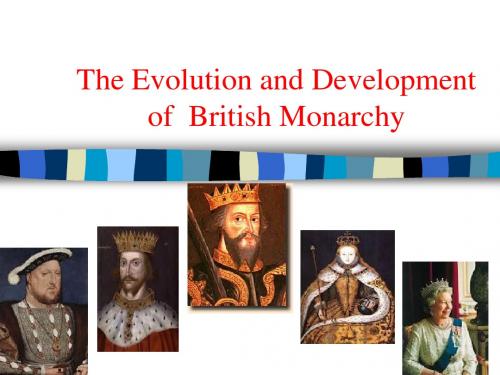
It is illegal to suspend laws and levy taxes without the approval of parliament
Declining of Royal Power
a. Magna Carta (Great Charter):
Issued in 1215. King John’s abuse of power 63 clauses No tax without the approval of the Grand Council;
Early Kings in Anglo-Saxon Period
Anglo-Saxon Conquest (446-871)
Angles, Saxons, and Jutes ( mercenaries)
warlord→ chieftain, the embryo of the early king.
d. Bill of Rights (1689)
Abolishing the royal power of the monarch to suspend laws or levy taxation or customs duties without Parliament's consent. Forbade the monarch to raise and maintain a standing army during peacetime without parliamentary consent.
The Wars of Roses (1455-1485) 1. A war among nobles for wealth and
power at home.
2. The House of Lancaster (a red rose) and
The Monarchy in Britain
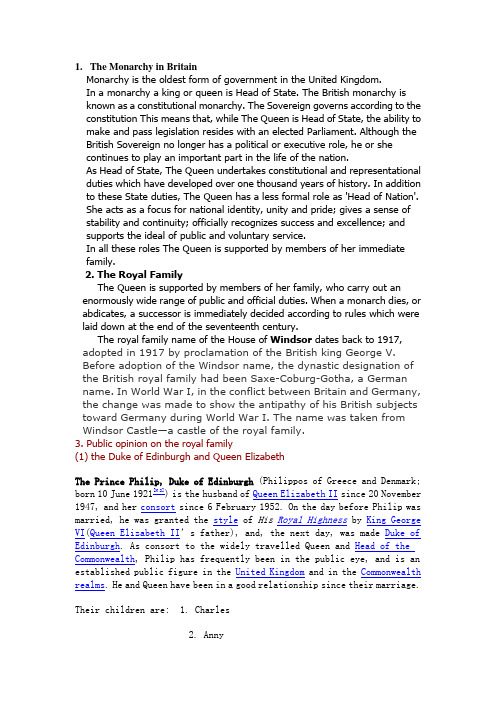
1.The Monarchy in BritainMonarchy is the oldest form of government in the United Kingdom.In a monarchy a king or queen is Head of State. The British monarchy is known as a constitutional monarchy. The Sovereign governs according to the constitution This means that, while The Queen is Head of State, the ability to make and pass legislation resides with an elected Parliament. Although the British Sovereign no longer has a political or executive role, he or she continues to play an important part in the life of the nation.As Head of State, The Queen undertakes constitutional and representational duties which have developed over one thousand years of history. In addition to these State duties, The Queen has a less formal role as 'Head of Nation'. She acts as a focus for national identity, unity and pride; gives a sense of stability and continuity; officially recognizes success and excellence; and supports the ideal of public and voluntary service.In all these roles The Queen is supported by members of her immediate family.2. The Royal FamilyThe Queen is supported by members of her family, who carry out an enormously wide range of public and official duties. When a monarch dies, or abdicates, a successor is immediately decided according to rules which were laid down at the end of the seventeenth century.The royal family name of the House of Windsor dates back to 1917, adopted in 1917 by proclamation of the British king George V. Before adoption of the Windsor name, the dynastic designation of the British royal family had been Saxe-Coburg-Gotha, a German name. In World War I, in the conflict between Britain and Germany, the change was made to show the antipathy of his British subjects toward Germany during World War I. The name was taken from Windsor Castle—a castle of the royal family.3. Public opinion on the royal family(1) the Duke of Edinburgh and Queen ElizabethThe Prince Philip, Duke of Edinburgh (Philippos of Greece and Denmark; born 10 June 1921[N 2]) is the husband of Queen Elizabeth II since 20 November 1947, and her consort since 6 February 1952. On the day before Philip was married, he was granted the style of His Royal Highness by King George VI(Queen Elizabeth II’s father), and, the next day, was made Duke of Edinburgh. As consort to the widely travelled Queen and Head of the Commonwealth, Philip has frequently been in the public eye, and is an established public figure in the United Kingdom and in the Commonwealth realms. He and Queen have been in a good relationship since their marriage.Their children are: 1. Charles2. Anny3. Andrew Albert Christian Edward born 19th February 1960.4.Edward Antony Richard Louis born 10th March 1964.(2) Prince Charles and DiannaCharles and Diana (1961-1997) were married at St. Paul's Cathedral on 29 July,1981. However, within five years, the "fairytale" marriage was on the brink of collapse. The continued presence of Camilla Parker-Bowles(born in 1947) in events and circumstances that also involved the royal couple became intolerable to Diana. The marriage of Charles and Diana was formally ended in divorce on 28 August 1996. On 31 August 1997, a year after the Prince and Princess divorced, Diana was killed in a car crash in Paris, along with her companion Dodi Fayed(a doubted Dianna’s boyfriend) and driver Henri Paul. Clarence House announced on 10 February 2005 that Charles and Camilla Parker-Bowles were engaged; and in April of that year they were married.a. Princess Dianna is enthusiastic to take part in many charity work, who created an image as someone at least more human, and somewhat more progressive, than the snooty, snobby, ice-cold House of Windsor in the public opinion. It's in large part because of this apparent contrast between Diana and the queen's clan that the masses feel a loss about her death. They feel she was different than the other royals. The newly-elected Labor Prime Minister Tony Blair found it was a difficult issue to deal with.In the wake of Diana's death, public-opinion polls show that for the first time, most people in Britain hold an unfavorable opinion of the monarchy. Some say Diana's death and the way the royal family acted during her life have turned them against Elizabeth, Charles and crew. The monarchy is irretrievably weakened, most observers agree.。
英国君主立宪制--British Constitutional Monarchy
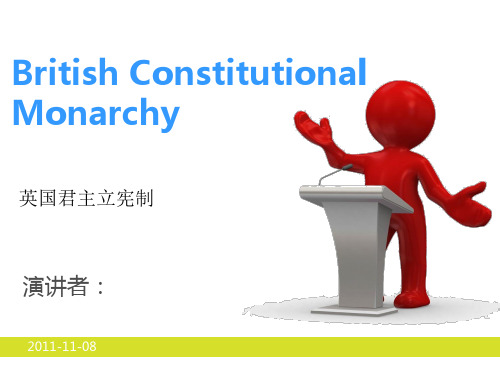
政党制度的演变
Whigs
the liberal party the labour party
Article6
except for the parliament 's permission,any other activities Military power of enlistment or maintaining a standing army, all belong to illegal.
Establishment of democracy 建立民主
《 Bill of right 》《权利法案》
The expansion of the right to be voted as the parliament representative
Complement of democracy 完善民主
election
The parliament ( legislative power )
The upper House
( judicial power )
people
11
Complement of democracy 完善民主
01
The expansion of the right to be voted as the parliament representative议会选举权的扩大 The evolution of party system 政党制度的演变 The formation of responsibility cabinet system 责任内阁制的形成
英国女王家庭英文版
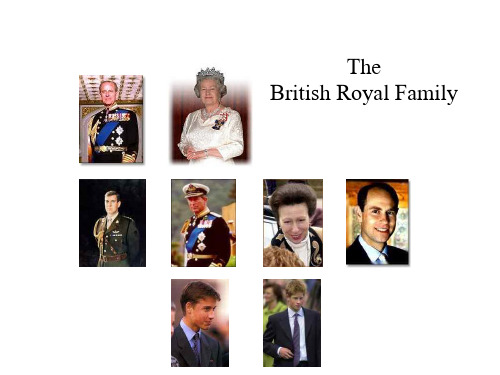
Her son......
• Prince Charles Philip Arthur George
• Duke of Cornwall and Prince of Wales (the Queen invested him on July 1, 1969)
- at the age of 3 he became heir apparent
• Bestows honour titles and pricings • The monarch has to be independent
The Government
• The Prime Minister
• (Tony Blair)
• He is the head of the Government
• gives agreement to billfolds, which have been passed in both chambers
• appoints the prime minister, government ministers, judges,officers,forces,diplomats and bishops
• in 1999 there was a reform - no hereditary peers anymore, only life peers
= since 1949 billfords can‘t be blocked by the H.o.L:
= the H.o.L can only stop new laws for max. one year
• He is the leader of his party
• The Cabinet
Britain Constitution Monarchy
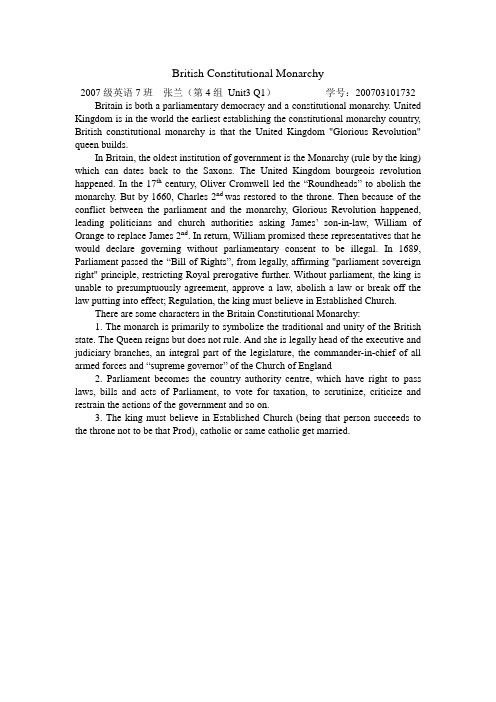
British Constitutional Monarchy2007级英语7班张兰(第4组Unit3 Q1)学号:200703101732 Britain is both a parliamentary democracy and a constitutional monarchy. United Kingdom is in the world the earliest establishing the constitutional monarchy country, British constitutional monarchy is that the United Kingdom "Glorious Revolution" queen builds.In Britain, the oldest institution of government is the Monarchy (rule by the king) which can dates back to the Saxons. The United Kingdom bourgeois revolution happened. In the 17th century, Oliver Cromwell led the “Roundheads” to abolish the monarchy. But by 1660, Charles 2nd was restored to the throne. Then because of the conflict between the parliament and the monarchy, Glorious Revolution happened, leading politicians and church authorities asking James’son-in-law, William of Orange to replace James 2nd. In return, William promised these representatives that he would declare governing without parliamentary consent to be illegal. In 1689, Parliament passed the “Bill of Rights”, from legally, affirming "parliament sovereign right" principle, restricting Royal prerogative further. Without parliament, the king is unable to presumptuously agreement, approve a law, abolish a law or break off the law putting into effect; Regulation, the king must believe in Established Church.There are some characters in the Britain Constitutional Monarchy:1. The monarch is primarily to symbolize the traditional and unity of the British state. The Queen reigns but does not rule. And she is legally head of the executive and judiciary branches, an integral part of the legislature, the commander-in-chief of all armed forces and “supreme governor” of the Church of England2. Parliament becomes the country authority centre, which have right to pass laws, bills and acts of Parliament, to vote for taxation, to scrutinize, criticize and restrain the actions of the government and so on.3. The king must believe in Established Church (being that person succeeds to the throne not to be that Prod), catholic or same catholic get married.。
英国皇室介绍英文ppt课件
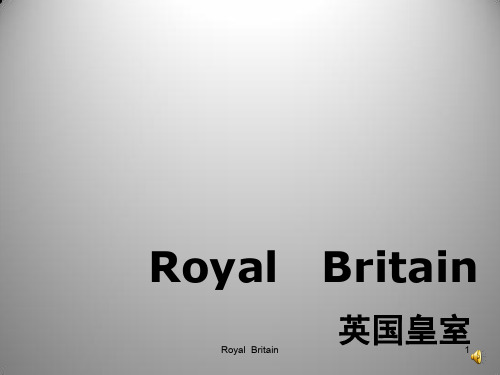
Royal Britain
3
Constitutional
monarchy 君主立宪
Trooping the Color
Elizabeth II
Prince Philip
Windsor Castle
Prince Charles
Princess Diana
Royal Britain
4
Trooping the Color(皇室军队庆典 游行)
with, Queen Elizabeth.
Royal Britain
14
Constitutional
monarchy 君主立宪
Trooping the Color
Elizabeth II
Prince Philip
Windsor Castle
Prince Charles
Princess Diana
Royal Britain
5
Constitutional
monarchy 君主立宪
Trooping the Color
Elizabeth II
Prince Philip
Windsor Castle
Prince Charles
Princess Diana
Hale Waihona Puke Royal Britain
6
Queen Elizabeth II
Royal Britain
20
Diana
VS
Camilla
Royal Britain
21
Constitutional
monarchy 君主立宪
Trooping the Color
Elizabeth II
英国皇室知识点总结
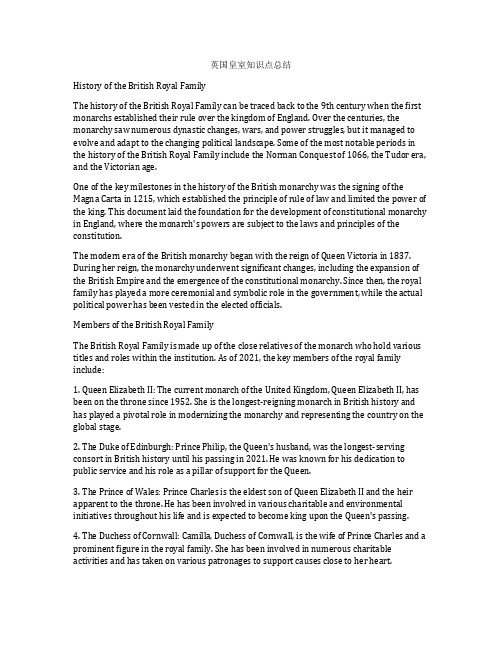
英国皇室知识点总结History of the British Royal FamilyThe history of the British Royal Family can be traced back to the 9th century when the first monarchs established their rule over the kingdom of England. Over the centuries, the monarchy saw numerous dynastic changes, wars, and power struggles, but it managed to evolve and adapt to the changing political landscape. Some of the most notable periods in the history of the British Royal Family include the Norman Conquest of 1066, the Tudor era, and the Victorian age.One of the key milestones in the history of the British monarchy was the signing of the Magna Carta in 1215, which established the principle of rule of law and limited the power of the king. This document laid the foundation for the development of constitutional monarchy in England, where the monarch's powers are subject to the laws and principles of the constitution.The modern era of the British monarchy began with the reign of Queen Victoria in 1837. During her reign, the monarchy underwent significant changes, including the expansion of the British Empire and the emergence of the constitutional monarchy. Since then, the royal family has played a more ceremonial and symbolic role in the government, while the actual political power has been vested in the elected officials.Members of the British Royal FamilyThe British Royal Family is made up of the close relatives of the monarch who hold various titles and roles within the institution. As of 2021, the key members of the royal family include:1. Queen Elizabeth II: The current monarch of the United Kingdom, Queen Elizabeth II, has been on the throne since 1952. She is the longest-reigning monarch in British history and has played a pivotal role in modernizing the monarchy and representing the country on the global stage.2. The Duke of Edinburgh: Prince Philip, the Queen's husband, was the longest-serving consort in British history until his passing in 2021. He was known for his dedication to public service and his role as a pillar of support for the Queen.3. The Prince of Wales: Prince Charles is the eldest son of Queen Elizabeth II and the heir apparent to the throne. He has been involved in various charitable and environmental initiatives throughout his life and is expected to become king upon the Queen's passing.4. The Duchess of Cornwall: Camilla, Duchess of Cornwall, is the wife of Prince Charles and a prominent figure in the royal family. She has been involved in numerous charitable activities and has taken on various patronages to support causes close to her heart.5. The Duke and Duchess of Cambridge: Prince William, the Duke of Cambridge, and Catherine, the Duchess of Cambridge, are the future monarchs after Prince Charles. They are known for their work in mental health advocacy, as well as their efforts to support the younger generation through various initiatives and charity work.6. The Duke and Duchess of Sussex: Prince Harry, the Duke of Sussex, and Meghan, the Duchess of Sussex, have recently stepped back as senior members of the royal family to pursue their own charitable and entrepreneurial endeavors. They have been vocal advocates for mental health awareness and social justice causes.7. Other members of the royal family: The British Royal Family also includes a number of other senior royals, such as Princess Anne, Prince Andrew, and Prince Edward, as well as their children and grandchildren. These members play a variety of roles within the royal family, including carrying out official engagements, representing the monarchy abroad, and supporting charitable causes.Duties and Responsibilities of the British Royal FamilyThe members of the British Royal Family are expected to fulfill a wide range of duties and responsibilities, which include:1. Representing the monarchy: The royal family members are often called upon to represent the monarchy at public events, state ceremonies, and diplomatic functions. They act as ambassadors for the United Kingdom and play a crucial role in maintaining and strengthening international relations.2. Charitable work: The royal family is involved in numerous charitable organizations and initiatives, and they often lend their support to causes such as mental health, environmental conservation, and education. Many members of the royal family have their own patronages and foundations through which they support various charitable endeavors.3. Supporting the armed forces: The British Royal Family has a long-standing tradition of supporting the armed forces and paying tribute to the military personnel. They often attend remembrance events, visit troops stationed abroad, and host receptions to honor the members of the armed forces.4. Promoting British culture: The royal family plays a significant role in promoting British culture, heritage, and traditions. They often engage with artists, scholars, and cultural institutions to celebrate the country's rich history and artistic achievements.5. Engaging with the public: The royal family members frequently undertake public engagements, where they meet with various community groups, organizations, and individuals. These engagements allow them to connect with the public and listen to the concerns and aspirations of the people they represent.Cultural Significance of the British Royal FamilyThe British Royal Family holds a special place in the hearts of many people in the United Kingdom and around the world. The monarchy's cultural significance is evident in various aspects of society, including:1. Tourism: The royal family's palaces, castles, and estates are major tourist attractions, drawing millions of visitors each year. The Changing of the Guard at Buckingham Palace, the State Opening of Parliament, and the annual Trooping the Colour ceremony are popular events that showcase the royal family's ceremonial duties.2. National events: The royal family's presence at national events and celebrations, such as weddings, jubilees, and state funerals, instills a sense of national unity and pride in the British people. These events also serve as opportunities for the public to come together and celebrate the country's history and traditions.3. Media and popular culture: The royal family is a frequent subject of media coverage and a source of inspiration for popular culture, including books, films, and television shows. The lives and activities of the royal family members are followed closely by the public, and their fashion, lifestyle, and philanthropy often set trends and influence public discourse.4. Heritage and tradition: The royal family is deeply intertwined with Britain's heritage and tradition, and its members are often seen as guardians of the country's historic legacy. The monarchy's role in ceremonial events, such as the State Opening of Parliament and the Queen's Birthday Honours List, reflects the continuity of British history and the preservation of its customs and values.Challenges and Modernization of the British Royal FamilyThe British Royal Family has faced a number of challenges and controversies in recent years, which have sparked debates about its relevance and future role in the United Kingdom. Some of the key challenges include:1. Public scrutiny: The royal family's private lives and personal choices have come under intense public scrutiny, particularly with the rise of social media and tabloid journalism. This has raised questions about the extent of privacy and autonomy that the royal family members should have in their public and personal lives.2. Financial support: The funding and financial arrangements of the royal family have been a subject of debate, with discussions about the taxpayers' contribution to the monarchy and the transparency of its expenses. There have been calls for greater transparency and accountability in the management of the royal finances.3. Modernization and diversity: The royal family has made efforts to modernize its image and adapt to the changing societal norms, including embracing diversity and inclusivity. This has included the selection of patronages and causes that reflect the diverse interests and concerns of the modern society.4. Role of the Commonwealth: The role of the royal family within the Commonwealth, a group of 54 nations with historical ties to Britain, has been a topic of discussion. Some nations have debated the relevance of the monarchy in their respective countries, while others have reaffirmed their allegiance to the Queen as the head of the Commonwealth.Despite these challenges, the British Royal Family continues to command respect and admiration from many people, and its members are committed to fulfilling their duties and representing the monarchy with dignity and dedication.ConclusionThe British Royal Family is a revered and iconic institution with deep historical roots and enduring cultural significance. Its members play a crucial role in upholding tradition, supporting charitable causes, and representing the United Kingdom on the global stage. While the royal family has faced various challenges and changes over the years, it remains a symbol of continuity, stability, and unity for the British people and the world at large. As the monarchy continues to evolve and adapt to the modern era, its influence and impact on society are likely to endure for generations to come.。
英语介绍英国君主立宪制的作文
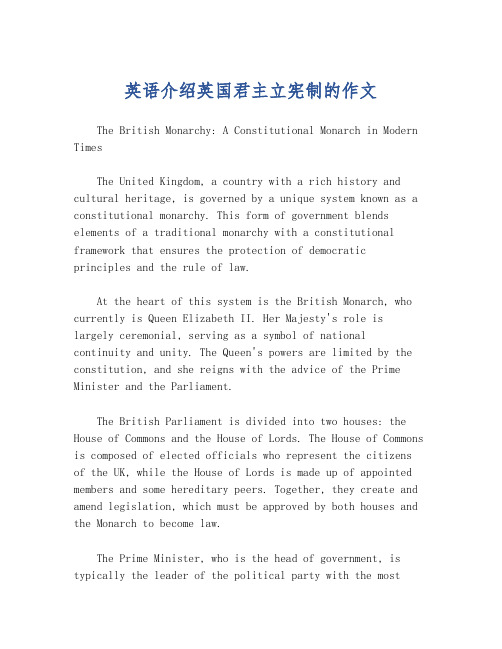
英语介绍英国君主立宪制的作文The British Monarchy: A Constitutional Monarch in Modern TimesThe United Kingdom, a country with a rich history and cultural heritage, is governed by a unique system known as a constitutional monarchy. This form of government blends elements of a traditional monarchy with a constitutional framework that ensures the protection of democraticprinciples and the rule of law.At the heart of this system is the British Monarch, who currently is Queen Elizabeth II. Her Majesty's role islargely ceremonial, serving as a symbol of nationalcontinuity and unity. The Queen's powers are limited by the constitution, and she reigns with the advice of the Prime Minister and the Parliament.The British Parliament is divided into two houses: the House of Commons and the House of Lords. The House of Commons is composed of elected officials who represent the citizens of the UK, while the House of Lords is made up of appointed members and some hereditary peers. Together, they create and amend legislation, which must be approved by both houses and the Monarch to become law.The Prime Minister, who is the head of government, is typically the leader of the political party with the mostseats in the House of Commons. The Prime Minister is responsible for running the country on a day-to-day basis and has significant influence over the direction of national policy.The constitutional monarchy has evolved over time, with the powers of the Monarch being gradually reduced as the role of Parliament has increased. This shift has been facilitated by various constitutional documents and legal precedents, which have established the supremacy of Parliament and the principles of responsible government.One of the key advantages of the constitutional monarchy is its ability to provide stability and continuity. The Monarch serves as a non-political figurehead, allowing for a sense of continuity even as governments change. Additionally, the Monarch plays a role in national ceremonies and the recognition of achievements by citizens, fostering a sense of national identity and pride.However, the system is not without its critics. Some argue that the Monarchy is an outdated institution that perpetuates class divisions and does not represent the values of modern democracy. Others contend that the Monarchy is a vital part of Britain's cultural identity and that it provides a sense of history and tradition that is important to the nation's psyche.In conclusion, the British constitutional monarchy is a complex and fascinating system that has adapted to the changing political landscape over centuries. It represents abalance between tradition and modernity, offering a unique blend of stability and democratic governance that is central to the identity and functioning of the United Kingdom.。
英国女王制度
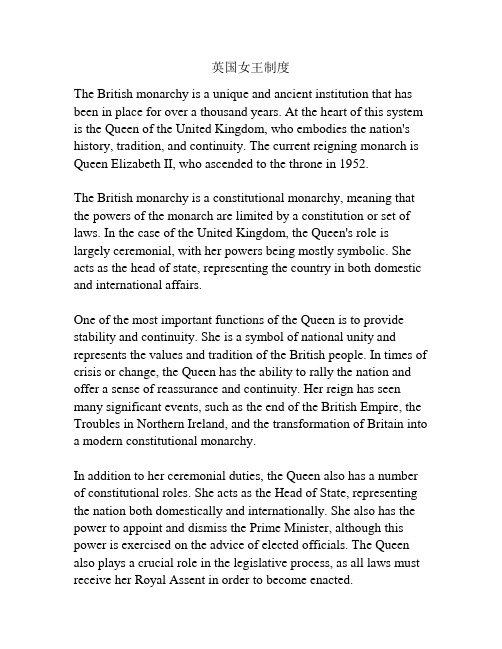
英国女王制度The British monarchy is a unique and ancient institution that has been in place for over a thousand years. At the heart of this system is the Queen of the United Kingdom, who embodies the nation's history, tradition, and continuity. The current reigning monarch is Queen Elizabeth II, who ascended to the throne in 1952.The British monarchy is a constitutional monarchy, meaning that the powers of the monarch are limited by a constitution or set of laws. In the case of the United Kingdom, the Queen's role is largely ceremonial, with her powers being mostly symbolic. She acts as the head of state, representing the country in both domestic and international affairs.One of the most important functions of the Queen is to provide stability and continuity. She is a symbol of national unity and represents the values and tradition of the British people. In times of crisis or change, the Queen has the ability to rally the nation and offer a sense of reassurance and continuity. Her reign has seen many significant events, such as the end of the British Empire, the Troubles in Northern Ireland, and the transformation of Britain into a modern constitutional monarchy.In addition to her ceremonial duties, the Queen also has a number of constitutional roles. She acts as the Head of State, representing the nation both domestically and internationally. She also has the power to appoint and dismiss the Prime Minister, although this power is exercised on the advice of elected officials. The Queen also plays a crucial role in the legislative process, as all laws must receive her Royal Assent in order to become enacted.The Queen also has a number of official residences, including Buckingham Palace in London, Windsor Castle, and Balmoral Castle in Scotland. These palaces serve as the backdrop for manyof the Queen's official duties and provide a place for her to carry out her role as Head of State.While the British monarchy is often seen as a symbol of stability and tradition, it has also evolved with the times. Queen Elizabeth II, in particular, has embraced modern technology and changing social attitudes. She was the first British monarch to send an email and has adapted to the digital age by launching her own Twitter account. The monarchy has also become more accessible and transparent, with the Queen opening up Buckingham Palace to the public and publishing the annual "Sovereign Grant Report" to disclose public funding.In conclusion, the British monarchy is a unique institution that has evolved over centuries. Queen Elizabeth II has played a significant role in modernizing the monarchy and adapting it to the changing times. While her powers are largely symbolic, she remains a symbol of stability and continuity, representing the nation both domestically and internationally. The British monarchy continues to be an important part of British culture and identity, embodying the nation's history and traditions.。
The role of the British Monarch

The role of the British Monarch, Queen Elizabeth II Introduction: As the head of the UK which was the founder of the system known as constitutional monarchy,Queen Elizabeth II is remarkable around the world. However,the role she plays as a monarch is unclear to some people. So My research paper focuses on the major function of the British Monarch,Queen Elizabeth II. I will expound it from four parts: her reflection of historical continuity, her ceremonial responsibility, her function of keeping solidarity, and her main political rights. Then I will briefly introduce some challenges Queen Elizabeth II is meeting. At last,I will give my own opinion upon the topic about the role of the queen. The character of the monarch nowadays in Britain is that she or he is just a symbolic sovereign. Nominally,Queen Elizabeth II is the head and generalissimo of the state.Formally,She can appoint and dismiss officials,summon、prorogue and dissolve the Parliament,consent bills and so on. However,all those she can do are done normally at the request of the Prime Minister or the Parliament. Actually,the function of the Queen isn’t the same as what we think.1、Firstly,Queen Elizabeth II,as head of state, reflects the historical continuity of the British political system. Just as Edmund Burke said,the regime of Britain is authorized by customs,and the only authority is the long history behind it. (George 300)In British people’s minds, theexistence of the monarch presents the authority of the history-- the monarch is the ruler of the sate all over the British history. Queen Elizabeth II plays a role as the symbol of the traditional British political system. She preserves the power and authority of the state system in her people’s hearts.2、Secondly,Queen Elizabeth II takes the ceremonial responsibility as a head of the state. She, as the head of the county, often goes to hospitals,schools and factories to visit her people. She presents in many important ceremonies. She represents the UK to go to other countries to visit their heads,showing their mutual good relationship. She also plays hostess to other countries’leaders or diplomats who are visiting the UK. She receives credentials presented by foreign diplomatic representatives. She should conclude treaties,declares wars,makes peaces,and recognizes foreign states and government after the Prime Minister and his cabinet have made a decision. All in all,she is the representative of the country. She does a lot of ceremonial things to preserve the country’s reputation in the hearts of her people and the people all over the world.3、Thirdly, Queen Elizabeth II plays an important role to preserve the solidarity among the nations of British Commonwealth. At present, the leaders of the majority of nations of the British Commonwealth are nominated by their own state. The other nations’ head is Queen Elizabeth II. She is the mutual leader of the 54 nations. She attends the meeting forthe heads of Government of the British Commonwealth to exchange and hear views. She often visits the countries of the British Commonwealth. As colonies of Britain before the World War II, even now , the economy,culture and politic of these nations are still intimately related to Britain. She is like a symbol to remind these countries:we used to be parts of Britain, and we should be together. In many British people’s hearts, Queen Elizabeth II is the symbol of solidarity.4、Ultimately,in her political life,Queen Elizabeth II has three rights :the right to be consulted, the right to encourage, the right to warn. The right to be consulted means that the Prime Minister should consult the queen for some affairs. However,the queen only gives the advice,and the decision still depends on the Prime Minister and his cabinet. The right to encourage means that she confers peerages,knighthoods and other honors on the noble or some prominent people on the recommendation of the Prime Minister. The right to warn means that if the queen reckons that some behaviors of the government are inappropriate,she can warn the government to stop or to correct them. But this situation seldom happens.In conclusion,Queen Elizabeth II is a monarch with limited power. Although having many rights which be exerted not freely,she is restricted by the Prime Minister and the Parliament. She should take responsibility to her behavior because she represents the whole country.Actually,She is a symbol of the state more than a ruler. However,the status of Queen Elizabeth II is meeting some challenges now. Firstly,many people in Britain,especially the young,are doubting the social function of the British royal court,including Queen Elizabeth II. They think that the UK will be OK without the queen and the royalty. (陈8) Secondly,they are considering that whether it is worth spending so much money on the queen and her royalties, especially now the whole country being in the trouble of economic crisis. Thirdly,the increasing number of scandals of the royalty cause bad impression on the people. Queen Elizabeth II is implicated, too. I am not a British person,but I still have my won opinion about the importance of Queen Elizabeth II. As the UK is controlled by political parties,Queen Elizabeth II who has no political power,seems more impartial than any other interest groups. She represents the interest of whole people in the nation,which includes different classes,hierarchies,blocs and parties. (王14)She is the symbol of the impartiality of the society,the unity of the country and the solidarity of the nation,and she gives her people great spiritual strength. In this case,Queen Elizabeth II is of the essence to the kingdom,and the country can not be without her role. All in all, Queen Elizabeth II reigns,but not rules. She reflects the historical continuity of British political system;she takes the ceremonial responsibility;she keeps the solidarity of British Commonwealth ;and she can exercise three main politicalrights. Although she,with her royalty,is meeting some challenge now,she is still quite important and essential to the UK..。
- 1、下载文档前请自行甄别文档内容的完整性,平台不提供额外的编辑、内容补充、找答案等附加服务。
- 2、"仅部分预览"的文档,不可在线预览部分如存在完整性等问题,可反馈申请退款(可完整预览的文档不适用该条件!)。
- 3、如文档侵犯您的权益,请联系客服反馈,我们会尽快为您处理(人工客服工作时间:9:00-18:30)。
British Monarchy
Monarchy, also known as parliamentary monarchy, is a governmental form in which Parliament exercises the supreme power. Britain is a typical representative of this governmental form. Constitutional monarchy has had a history of more than 300 years and firstly established in Britain. It has been continuously perfecting itself nowadays. It differs from absolute monarchy in that an absolute monarch serves as the sole source of political power in the state is not legally bound by any constitution. Most constitutional monarchies employ a parliamentary system in which the Monarch may have strictly ceremonial duties or may have Reserve Powers, depending on the constitution, have a directly or indirectly elected prime minister who is the head of government exercises effective political power. Britain is the democratic cradle of western politics in world. Monarchy had been advancing while being constrained, that is to say, both the king nobility have certain rights obligations to maintain a balanced relationship.
Britain, as the head of leading to develop capitalism, has suffered from a long tortuous history in order to create the very political structure, which serves for the survival development of capitalism. Constitutional monarchy has had a significant far-reaching influence on British society.
Constitutional monarchy is a pretty important political structure in Britain. During its 300-year history of development, it has been generated an enormous impact in the political system of the European countries, expanding to the world. constitutional monarchy plays the bellwether in exploring the road of representative governmental system.
Besides, British monarchy influences British culture a lot. The English Nation is a stable legalistic people. In the long course of historical development, they formed legal tradition
the idea of loyalty. This tradition was reserved during the process of development. Still now, among different classes in Britain, they all hold full respect to their majesty. In spite of monarch, as head of state, is a symbol of authority.
British people owe much to the king for the boost of social economic development. In a sense, King is an idol of the whole nation for prote cting people’s freedom property. For example, Charles II was welcomed when he returned with a promise that “respecting Parliament”; on the contrary, feeling of relaxation filled the whole country after Cromwell’s death. The former one was under Parliament while the latter was not. That is why the English nation supports King. The establishment of parliamentary system is aiming to adapt to the capitalist socio-economic development the need for political democratization, likewise the reservation of monarchy was determined by considering the tradition the objective reality. Therefore, constitutional monarchy is the best choice made by bourgeois nobility under the historical and recent conditions.。
